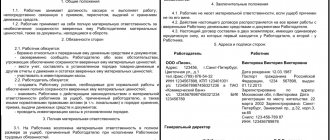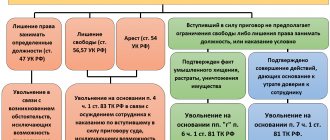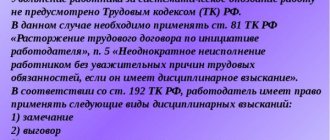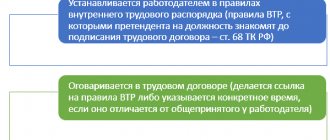5/5 (15)
Features of termination of the contract under clause 3 of Art. 77
When dismissing an employee due to his own expression of will, one should be guided by two norms of the Labor Code of the Russian Federation - paragraph 3 of part 1 of Article 77 (general list of grounds) and Article 80 (special regulation), also taking into account the commentary to the second of them.
According to Art. 80 of the Labor Code of the Russian Federation, the rules are as follows:
- the employee has the right to terminate his employment relationship with the employer if he notifies this in writing at least 2 weeks before the expected end of work;
- the period for informing the employer in some cases may be different if this is stipulated by law;
- in some cases, when termination of the contract is caused by a situation that does not depend on the employee’s actions (for example, his admission to a university as a full-time student) or related to the unlawful behavior of the employer, the employee has the right to independently choose the period for informing the administration about his resignation;
- the final day of work is the day of full financial settlement with the dismissed person and the delivery of his work book and other documents listed in the law;
- an employee who has announced his resignation may withdraw his application before the end of his service period, except in cases where a new specialist has already been invited to this position;
- if the employee changes his mind and does not want to terminate the contract, it continues in effect.
Step-by-step instruction
Termination of an employment relationship at the request of the employee usually causes the least difficulties. As a rule, the parties to the contract come to an agreement and there are no conflicts between them.
However, unscrupulous employers often force employees to write letters of resignation, thereby substituting the real grounds for dismissal. In this case, the interests of the employee may suffer, and such dismissal is considered illegal. Then the court reinstates the dismissed citizen.
The step-by-step dismissal procedure is as follows:
- filing by an employee of an application for upcoming dismissal. You need to pay attention to the end date of work indicated in the document. It is necessary to formulate this way: “I ask you to dismiss me on August 1,” but not “from August 1.” The date of dismissal will be the final day of work in the organization;
- the period between filing an application and dismissal. Typically, the law requires a two-week period; for management it is equal to a month. But if both parties do not object, this period can be reduced. The employer does not have the right to change it downward independently;
- issuing an order to dismiss a citizen. The order is issued on the employee’s final day of work and is presented to him for review. If the citizen so desires, he is given a copy of the order;
- issuing to the employee a certificate of the salary received over the last 2 years. The document is handed over to the employee on the day of his dismissal or, if this is not possible, within 3 days after his relevant application;
- generation of a certificate or other document with information for the Pension Fund. The law does not stipulate the exact form of the document, but the forms specified by the Pension Fund of the Russian Federation must be used;
- a record of the dismissal in the employee’s personal card;
- generation of a settlement note in relation to an employee. The document contains information about the employee, information about the period of his work and data on accruals and payments upon dismissal;
- full payment. All amounts must be paid to the dismissed employee on the day of termination of work. If the citizen was not at work that day, the money is issued on the day immediately following the receipt of such a request from him;
- entry in the work book. After entering the information, the book is issued to its owner;
- return to the citizen copies of the documents that he submitted when applying for a position.
Watch the video. Dismissal at will without work:
In what cases should they calculate without objection?
Dear readers! The article talks about typical ways to resolve legal issues, but each case is individual. If you want to find out how to solve your particular problem , contact a consultant:
8 (800) 700 95 53
APPLICATIONS AND CALLS ARE ACCEPTED 24/7 and 7 days a week.
It's fast and FREE !
The most popular form of payment is voluntary dismissal, which is a formalized initiative of the employee himself.
After submitting the application, the employer must consider it and implement it in accordance with Article 80 of the Labor Code of the Russian Federation. According to it, it is drawn up:
- entry in the work book (issued on the last working day);
- organization order;
- full cash settlement;
- In case of absence from the workplace due to vacation or illness, the payment is made on the day of return to work.
According to Art. No. 77, 78, 80 of the Labor Code of the Russian Federation, which take into account new amendments, the employee must write a letter of resignation 2 weeks before leaving.
Thus, he has exactly 2 weeks (calendar days) left for revision. For those who are in a hurry, there are legal ways to avoid detention and leave almost immediately after 3 calendar days.
This applies to people who have entered into an agreement with their employer:
- temporary employment contract, part-time (Article 292 of the Labor Code of the Russian Federation);
- contract for seasonal work for 2 months (Article 296 of the Labor Code of the Russian Federation).
If an employee has accumulated unused vacation days, they can be applied for with prior approval from management, but not during vacation. In this case, the last day of rest will be spent as the last working day.
Another way of dismissal is by agreement of the two parties.
According to it, the employer also may not require working time (Article 77). To do this, you need to discuss the situation with the employer himself so that he agrees to a meeting.
If this cannot be achieved, you can try to provide more compelling reasons. They must be documented and are listed in full in Article 80.
It is also referred to in Article 77, paragraph 3, part 1:
- certificate of study at a university;
- certificate of disability or need to care for a disabled person;
- pensioner's ID;
- in connection with the relocation of a spouse;
- family circumstances, especially if the family has several children under 18 years of age;
- health status;
- pregnancy.
If all the described cases are not taken into account, the court, which is the final authority in such a case, will help. This is true for both civil servants and employees of private companies.
The last example that we will give in this section is leaving work after sick leave for health reasons:
- In reality, this method is prohibited by law.
- In some cases, this may give rise to legal proceedings; the case is classified as abuse.
- If there really is a disease, this is confirmed by documents, then only after the end of treatment such an employee can resign, but write a statement during the period of treatment while on sick leave.
Application form
The list of unified forms does not contain a statement of termination of the employment contract. Therefore, situations in which an application is refused to be accepted due to non-compliance with the mandatory form are practically excluded.
Moreover, the law prohibits such an approach in paragraph 3 of part 1 of Art. 77 Labor Code of the Russian Federation. However, HR departments usually have templates on which employees are encouraged to write their own application.
Since an order will be issued based on the application in the future, it is necessary that the text contain:
- position and surname with the initials of the head of the employing organization;
- the basis for termination of the contract is here: personal desire;
- reference to an article of the Labor Code (Article 80);
- date of the final day of work. Since we are talking about leaving at the request of a citizen, it is he who must determine the day of completion of the work. The employer does not have the right to do this. This point was clearly stated by S. A. Panin in the commentary to the Labor Code of the Russian Federation of 2002, edited by him;
- Full name and position of the employee;
- date of application and signature of the applicant.
If the applicant has grounds for reducing the employer's normal two-week notice period, he must refer to this in the application.
Please note! The application must be accepted with the appropriate mark on it with the date of acceptance. If the employer's representative refuses to do this, you will have to send the application by registered mail with notification. However, you need to remember that the working period in this case will begin from the day the employer receives the registered letter.
Consent of the parties: what is the difference?
There are situations when an employee is forced to write a letter of resignation of his own free will. The reasons, of course, are purely individual. The new director is selecting personnel, the employee is no longer happy, there is a reorganization, pregnant women are often forced to do this, etc. The Labor Code has two paragraphs of Article 77, which seem equivalent to ordinary citizens:
- By agreement.
- At your own request.
Many professional lawyers involved in labor disputes know that termination of a contract in the second case can be challenged in court. It is enough to provide arguments and prove that the employee was subjected to psychological influence by the administration of the enterprise. Consequently, the termination order will be canceled in court, and the employee will be reinstated with all rights.
Clause 1 art. 77 of the Labor Code of the Russian Federation does not provide for such a loophole. It just follows from the fact that the employee and the employer have any conflicts and disagreements.
As a rule, the former employee is paid some kind of “compensation” funds in order to terminate the employment relationship peacefully and without consequences for both parties. In court, all arguments will be useless. It is almost impossible to regain your labor rights.
Issuance of an order by the manager
The document that formalizes dismissal is an order. It is published on the day the citizen ends his work in this organization. From the moment the order is signed by the manager, the employee is considered dismissed.
The general form of the form for issuing an order: T-8 - for one employee, T-8a - for several.
The law does not oblige you to adhere to this particular format, the main thing is that all the necessary information appears in the text:
- employer's name and organization code in the OKPO system;
- registration number of the order and date of its execution;
- details of the contract concluded with the employee upon hiring;
- the date from which the person is considered dismissed;
- Full name of the citizen and personnel number;
- the position of the employee with clarification of the department, if any;
- grounds for termination of the contract (clause 3, part 1, article 77 of the Labor Code of the Russian Federation);
- documentary basis for termination of the contract - application;
- signature of the manager and signature of the citizen in the acquaintance.
"Correct" article
Despite the basic basic principles of legal acts, namely “absolute clarity in wording,” misunderstandings very often arise. Under what article should dismissal be made? Clause 3 Art. 77 or art. 80 Labor Code of the Russian Federation?
But in fact there is no problem in understanding here. One is considered procedural (how to legally change jobs correctly), and clause 3 of Art. 77 of the Labor Code of the Russian Federation – normative, i.e. indicates the fact itself.
Almost everyone knows that you need to work for 2 weeks before leaving the organization. Let us immediately clarify one very important nuance.
Dismissal (clause 3 of Article 77 of the Labor Code of the Russian Federation) does not provide for any work.
You just need to notify the employer no later than this period. Of course, during this period you will have to perform your functions at the enterprise. Hence the erroneous opinion. But let us clarify that compulsory work for half a month is optional.
You can go on sick leave or vacation, warning your employer about future dismissal. In this case, there can be no processing.
Filling out a personal card and payment note
The employee’s personal card has a T-2 form; it requires an entry about the dismissal. The basis will be the employee’s own desire.
Remember! The date of dismissal is the day the employee ends his work in this company. The record must also contain the date and number of the dismissal order.
The record is certified by the signature of the personnel officer, then the citizen himself signs that he has familiarized himself with its contents.
At the same time, the accounting department generates a calculation note in the T-61 form. Payments due to the employee are included in it.
What wording should be included in the work book?
The dismissal procedure is accompanied by the obligatory delivery of the employee’s work book. By this time, an entry must be made in it containing information about the work in this organization and the dismissal.
The entry in the work book contains:
- employer's name, according to documents:
- the date the person was hired;
- job title according to the staffing table;
- an employment contract or other basis for employment;
- date of completion of work (dismissal);
- the reason and basis for the employee’s dismissal;
- organization seal;
- certifying signature of a personnel service employee;
- signature of the citizen himself.
An employee who resigns of his own free will must receive a work book, which must contain the following reference: clause 3 of Art. 77 of the Labor Code of the Russian Federation.
But even here, inaccuracies arise when HR department employees write the following entry: “dismissed at his own request in accordance with clause 3 of Art. 77 Labor Code of the Russian Federation."
To avoid any controversial situations in the future when re-employing, all records of dismissal must be brought into compliance with the provisions of labor legislation.
Thus, the only correct entry in the case under consideration is: “dismissed under paragraph 3 of Article 77 of the Labor Code of the Russian Federation - termination of the employment contract at the initiative of the employee.”
The meaning immediately changes, despite the fact that the norms of the law remain the same.
Features of voluntary dismissal during vacation or illness
According to the law, voluntary dismissal during vacation is not prohibited. In addition, before leaving, an employee has the right to write an application for leave with subsequent dismissal.
Attention! Dismissal immediately after a vacation is a right, and not an obligation, of the boss; therefore, the employee’s request may be refused, and the employer is obligated to pay compensation for the unrealized right to vacation.
Due to the fact that the domestic legislator has not resolved this issue, judicial practice has developed an approach to providing calculations and necessary documents when dismissing an employee after a vacation.
According to established judicial practice, before a vacation, the employee is paid and given a set of documents, despite the fact that the last day of the employment contract is the last day of rest.
If on the day of dismissal a person is on sick leave, then payments are made to him in the general manner and documents are issued; there are no restrictions in this case.
Calculation procedure
The legislator obliges to complete all settlements with the employee on the day of completion of his activities in the organization. Then his work book is returned to him. If this order is violated, a citizen has the right to consider his interests significantly violated and count on full compensation for all types of damage - both financial and moral.
Interest is accrued for each day the payment deadline is missed. In addition, the law provides for fines for late payment, which apply to the organization itself, its management, and responsible employees.
The calculation includes the following amounts:
- salary accrued at the time of departure, but not paid;
- compensation for unused vacation periods, according to Art. 127 Labor Code of the Russian Federation;
- payments based on sick leave certificates submitted by the employee;
- other benefits and bonuses provided for by laws (for certain cases of dismissal) and acts of the organization.
All payments are made on the last day of work, with the exception of sick leave payments. The law allows you to pay it not on the day of dismissal, but later, on the day of payment of wages to employees following the date of dismissal, in cases where the period between the submission of sick leave and the day of payment of wages was more than 10 days.
In addition, the law imposes on the employer the obligation to pay for sick leave provided by dismissed employees within a month from the date of termination of work, unless they have taken a job in another organization.
Keep in mind! If a citizen does not show up for service on the day of payment, all payments to him must be made the next day after he makes the relevant demands. A work book is an important document. If the employee does not show up to receive it, he is sent a registered letter offering to pick up the book or allow him to send it by mail. Receipt of receipt of the letter should be retained.
When will the payment be made?
After an official order, all payments for time worked must be made on the day of dismissal. And this is not a “gift” from the company, it is an obligation according to the Labor Code. Violation of this norm is a reason to defend your rights and contact regulatory authorities. In addition to salary, the employee is entitled to payment for unused vacation. You can calculate it yourself if you know your average monthly earnings and the exact number of days worked. Payments under it must also be made on the day of the dismissal order.
The only exception to this rule is sick pay. From the moment the medical certificate is provided, the accounting department recalculates within 10 days and pays it on payday at the enterprises.
If the employee is not on site on the day of payment (business trip, vacation, sick leave), then all payments must be made no later than one day after his request.
How to avoid detention
As already mentioned, the general notice period of intention to terminate the contract is 2 weeks. In some cases, the law allows you to shorten the period between notification to the employer and the end of the activity.
Such exceptions include the following cases:
- the employee is accepted under the condition of a probationary period - the warning must be received 3 days before leaving;
- the employer violated labor legislation, as a result of which the employee’s interests were harmed - the employee himself has the right to choose the period of work;
- The parties to the labor relationship are mutually interested in reducing the working period and have come to an agreement on this issue. This usually happens if the employer wants to quickly replace the employee with another specialist, and he does not mind leaving earlier;
- the employee was admitted to an educational institution, studies in which do not allow him to continue working in the organization. Documentation of admission must be submitted;
- the employee has a registered disability or disabled children in need of care. The fact of obvious deterioration of the condition, noted by doctors, is also important. The law allows in these cases to resign before the expiration of 14 days from the date of notification to the employer;
- the citizen was called up for military service;
- the employee (worker) is forced to move after his spouse, in respect of whom there is an order for a long-term transfer to another location;
- the citizen is sick, as evidenced by the sick leave certificate. During the period of incapacity, you can quit without working. In such a situation, the days reflected on the sick leave will replace the working period.
Features for a pensioner
Having reached the age limit established by law, every citizen has the right to count on pension provision from the budget.
The procedure for registering dismissal caused by such circumstances is no different from the general procedure described above. As for the working period, there are differences.
If a citizen indicates in his application that he wants to resign due to retirement, then he can leave at any time convenient for him, even without working as such.
This opportunity is given precisely upon retirement. Pensioners dismissed on this basis and re-employed are no longer entitled to enjoy the privilege of dismissal without service.
Guided by the norms of the Labor Code of the Russian Federation, it is not difficult for an employer to carry out dismissal in full compliance with the requirements of the legislator. In any organization, this process must be worked out, since hiring and dismissing employees are integral elements of company activities.
What to do if the application is not signed
Although the provisions of labor legislation provide maximum support for the employee in respecting his interests, employers often ignore the norms of the Labor Code of the Russian Federation, not wanting to let go of good specialists.
This may be expressed in a refusal to sign a resignation letter. This position absolutely does not comply with the requirements of the law. The employee must remember that he has the right to end his career in the organization 14 days after submitting the application to the employer, regardless of whether the employer wishes to sign it or not.
As mentioned above, on the day the work ends, the citizen must be returned his work book with the entry and paid all amounts required by law. If this obligation is not fulfilled by the employer, this may entail very unpleasant legal and financial consequences for him.
Refusal to issue a work book and delay in payments due are a gross violation of legal standards in the field of labor. Regardless of the reasons that prompted the employer to do this, the courts in such cases unconditionally side with the employees, so it is important for citizens to remember the possibility of judicial appeal of such violations.
It happens that employers threaten employees who want to leave with dismissal “under the article,” that is, for committing a disciplinary offense. If such an act did not actually happen, you should not be afraid of such threats.
Also, such threats are impossible to implement if the offense was committed a long time ago and is reflected in the company’s internal documents.
Attention! Our qualified lawyers will assist you free of charge and around the clock on any issues. Find out more here.
If you change your mind, what should you do?
Such cases are also not uncommon. The reasons can be different: there was no agreement on a new place of work, the director realized that the employee really wanted to leave, and improved working conditions and much more.
To cancel an application that has already been submitted, you must write and also officially register a new one in accordance with all the rules. No matter how good the relationship between him and the employer may seem to the employee, it is important to know the main rule: the application for refusal of dismissal must be submitted officially, i.e. in writing through a secretary or by mail.
How to withdraw a resignation letter
Sometimes, after submitting a resignation letter, circumstances change and the employee expresses his desire to continue working. He has every right to do this, if the corresponding order has not yet been issued. All you need to do is submit a new application to revoke the previous one.
There is only one exception - if another specialist was invited to fill this position, and there is written confirmation of this.
If the employee was not provided with an order for his dismissal, he can simply continue his work in this company.
There are similar guarantees for the employer. Part 6 art. 80 of the Labor Code of the Russian Federation allows the employer not to take into account and consider invalid the resignation letter submitted by the employee if he continues to work after the day indicated as the date of dismissal.
If after this he again wants to terminate the employment contract, the application will need to be submitted again and indicate a new date, taking into account 2 weeks of work.
If the employer forced the employee to resign on his own initiative, it is important to provide evidence of such coercion.
In this case, it will be possible to obtain reinstatement in court with compensation for the break in work that occurred.








